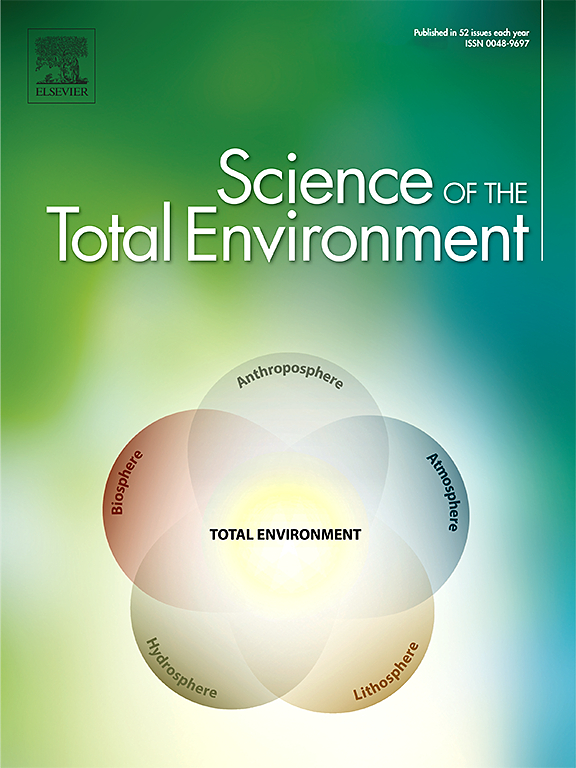半干旱气候下处理过的污泥对土壤和小麦生长特性的影响
IF 8
1区 环境科学与生态学
Q1 ENVIRONMENTAL SCIENCES
引用次数: 0
摘要
污泥积累作为废水处理的副产品是一个日益受到关注的问题,可以通过利用污泥作为土壤改良剂来解决。研究了污泥作为有机改良剂对旱作小麦(Triticum icaversea)土壤性状、微生物活性、小麦产量和籽粒品质的影响。这项研究是在黎巴嫩进行的,由于缺乏适当的处理和处置方法,污泥堆积问题尤其重要。从二级(SS)和三级(TS)污水处理厂收集的污水污泥的基线特征表明,这两种污泥类型都可以归类为适合限制农业用途(B类),不能用于土壤中种植生吃的水果或蔬菜。改良土壤收获后分析显示,与对照相比,SS和TS处理在两个季节的有机质、土壤水分、小麦产量和籽粒品质均有显著提高。除锌(Zn)外,污泥中重金属含量均远低于农业土壤允许值。与对照(46 g/m2)相比,两种处理土壤(SS: 74 g/m2, TS: 81 g/m2)的小麦生物量和籽粒品质均有显著提高(61 - 76%)。在TS处理下,第一季籽粒蛋白质含量最高(14.5%)。两季土壤微生物分析结果不一致,但第二季施施SS存在总大肠菌群污染的潜在风险。本研究为处理后的污泥应用对土壤肥力和小麦品质的积极影响提供了有价值的见解,强调了污泥在可持续农业中的潜在效益。它还强调了监测污泥和土壤质量的必要性。本文章由计算机程序翻译,如有差异,请以英文原文为准。

Impact of treated wastewater sludge on soil and wheat growth characteristics in a semi-arid climate
Sludge accumulation as a byproduct of wastewater treatment is an increasingly growing concern which can be addressed by utilizing the sludge as a soil amendment. A two-year study was conducted to valorize sludge as an organic amendment on soil cultivated with rainfed wheat (Triticum icaversea) and its impact on soil properties, microbial activity, wheat yield and grain quality. The study was conducted in Lebanon, where the sludge accumulation problem is especially important given the absence of proper treatment and disposal methods. Baseline characterization of sewage sludge collected from secondary (SS) and tertiary (TS) wastewater treatment plants showed that both sludge types can be classified as suitable for restricted agricultural use (Class B), which cannot be used on soils to grow fruits or vegetables that are eaten raw. Post-harvest analysis of the amended soils revealed a significant enhancement in organic matter (OM), soil moisture, wheat yield and grain quality in both seasons in SS and TS treatments compared to the control. All tested heavy metals in the sludge were much lower than the allowable limits for agricultural soils, except for zinc (Zn). Wheat biomass and grain quality improved with a significant increase in grain yield (61–76 %) in both treated soils (SS: 74 g/m2, TS: 81 g/m2) compared to the control (46 g/m2). Under the TS treatment the grain had the highest protein content (14.5 %) in the first season. Soil microbial analysis were not consistent in the two seasons, but showed a potential risk of total coliforms contamination with SS application in the second season. This research provides valuable insights into the positive effects of treated sewage sludge application on soil fertility and wheat grain quality emphasizing the potential benefits of this sludge in sustainable agriculture. It also highlights the need for monitoring sludge and soil quality.
求助全文
通过发布文献求助,成功后即可免费获取论文全文。
去求助
来源期刊

Science of the Total Environment
环境科学-环境科学
CiteScore
17.60
自引率
10.20%
发文量
8726
审稿时长
2.4 months
期刊介绍:
The Science of the Total Environment is an international journal dedicated to scientific research on the environment and its interaction with humanity. It covers a wide range of disciplines and seeks to publish innovative, hypothesis-driven, and impactful research that explores the entire environment, including the atmosphere, lithosphere, hydrosphere, biosphere, and anthroposphere.
The journal's updated Aims & Scope emphasizes the importance of interdisciplinary environmental research with broad impact. Priority is given to studies that advance fundamental understanding and explore the interconnectedness of multiple environmental spheres. Field studies are preferred, while laboratory experiments must demonstrate significant methodological advancements or mechanistic insights with direct relevance to the environment.
 求助内容:
求助内容: 应助结果提醒方式:
应助结果提醒方式:


